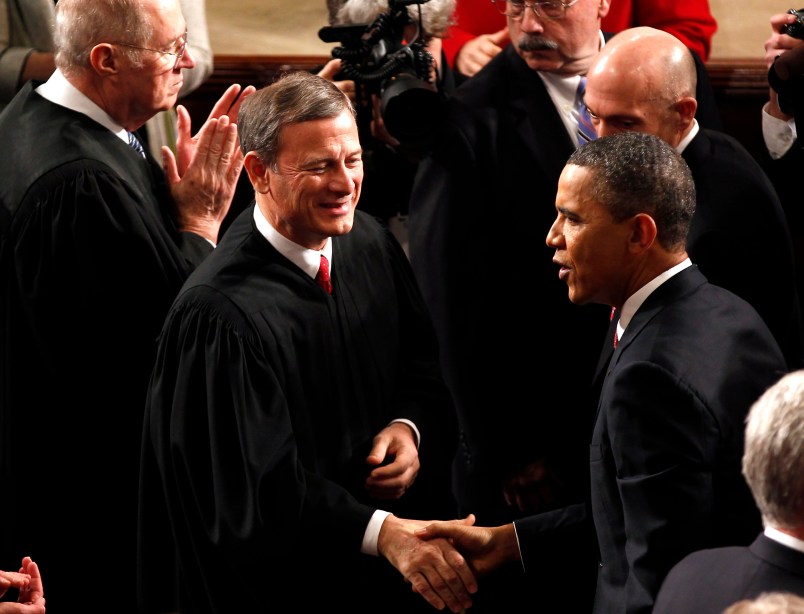Conservative-leaning justices took some tactical jabs Tuesday at President Barack Obama’s unilateral actions to delay or tweak some parts of Obamacare, wondering if they undercut his case for the birth control mandate.
“What kind of constitutional structure do we have if the Congress can give an agency the power to grant or not grant a religious exemption based on what the agency determined?” said Justice Anthony Kennedy, echoing frustrations expressed by Republican lawmakers. “When we have a First Amendment issue of this consequence, shouldn’t we indicate that it’s for the Congress, not the agency to determine that this corporation gets the exemption or that one?”
At issue during the oral argument was the validity of Obamacare’s requirement that employer health plans cover emergency contraceptives for female employees at no extra cost. Amid an uproar in 2012, Obama bypassed Congress and carved out an accommodation via executive fiat to let religious nonprofits opt out of paying for the contraceptives.
Kennedy invoked that exemption and wondered aloud if it damages the White House’s case that the birth control regulation is justified by a compelling interest, which is central to the legal question of whether it runs afoul of the Religious Freedom Restoration Act (RFRA). He told Donald Verrilli, the president’s top lawyer, that the administration “gave this exemption, according to your brief, without reference to the policies of RFRA.”
Chief Justice John Roberts asked about the delay of Obamacare’s “grandfathering” clause, a decision aimed at reducing cancellations of substandard health plans in the wake of the law’s botched rollout. Verrilli wouldn’t say how long the carve-out would last, prompting Roberts to ask, “shouldn’t we assume in our analysis that it is current and, as far as we can tell, not going to end?”
Seconds later, Justice Samuel Alito noted that the executive action to tweak the grandfathering clause meant insurers would, when selling certain plans, be exempt from complying with regulations such as the preventive services mandate, under which the birth control rule at stake falls.
“So isn’t [the Department of Health and Human Services] saying there, quite specifically, these, in our view, are not within this subset of particularly significant requirements as to which there must be immediate compliance?” he asked.
In response, Verrilli argued that delays of certain provisions don’t necessarily undercut their importance, offering an example. “I don’t think anybody would doubt that the Americans with Disabilities Act advances interest of the highest order,” he said. “But when Congress enacted that, it put a two year delay on the applicability of the discrimination provision.”
The justices’ concerns are relevant the case, which was brought by owners of Hobby Lobby and Conestoga Wood, who said it would violate their Christian beliefs to cover emergency contraceptives like Plan B and Ella in their health plans. They argue that these drugs prevent fertilized eggs from implanting in a woman’s uterus. (Scientists have yet to find definitive evidence of this claim.)
Justice Antonin Scalia wondered if axing the mandate would have much of an impact on women.
“You’re talking about, what, three or four birth controls, not all of them, just those that are abortifacient,” he said. “That’s not terribly expensive stuff, is it?






